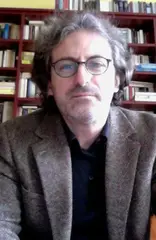New research project on the reception of the "Corpus Areopagiticum" in the Orthodox Christian world in the 20th century
![[Translate to English:] Dionysius Areopagita: russische Ikone aus dem 17. Jahrhundert](/fileadmin/_processed_/5/f/csm_Dionysius_Areopagita_Russische_Ikone__7_Jh_edfef424d4.webp)
Under the title "Pseudo-Dionysius the Areopagite's Reception among Key Thinkers of the 20th Century Orthodox World (Vl. Lossky, Fr. Sophrony, Chr. Yannaras, J. Zizioulas)", it will examine the multifaceted reception of the 6th century scriptural corpus attributed to Dionysius Areopagita by four pioneering Orthodox theologians in the 20th century: on the Russian side (but active in Western Europe), Vladimir Lossky and Old Father Sofronij (Sakharov); and on the Greek side, Christos Yannaras and Metropolitan John Zizioulas.
Dionysius was held in high esteem in both East and West (e.g. by Maximus the Confessor, John of Damascus, Thomas Aquinas and Gregory Palamas). Since the Renaissance, however, beginning with the discovery of his pseudonymity, Western Christianity became more critical of Dionysius, while influential Orthodox theologians (e.g. J. Meyendorff) also adopted this critical reading. In contrast, Lossky regarded Dionysius' key doctrine, namely apophatism, as the fundamental distinguishing feature of Orthodoxy from the Latin West. Yannaras also followed Lossky and tried to look at Dionysius from a specific perspective in order to show his Western misreading. On the other hand, Zizioulas largely ignores Dionysius in his theological work. Finally, for the same reason, Old Father Sofronij did not pay special attention to Dionysius, although he was critical of his views on an abstract ascent to God.
It is thus about a different Orthodox reception of Dionysius in the 20th century, revealing essential tendencies within Orthodox theology and its development in modernity, which are not free of ideological premises (e.g. anti-Western) and subjective interpretations. In any case, this is a period in which the Orthodox world tried to rediscover its supposedly lost "authentic identity" away from distorting Western influences - a controversial process with mixed results. This project attempts, on the one hand, to explain the above-mentioned differences in the Orthodox evaluation of Dionysius and to consider their respective backgrounds. On the other hand, it undertakes to deconstruct these orthodox readings of Dionysius. By showing, firstly, the contingency of their anti-Western discourse, since various Western influences can still be detected in them. Secondly, it aims to show the often arbitrary and fragmentary use of the Orthodox past and tradition by contemporary ways of looking at things, which are based on idiosyncratic criteria and sometimes arbitrary perspectives. Prof. Vasilios N. Makrides explains:
Ultimately, this comprehensive analysis of the Orthodox reception of Dionysius will hopefully demonstrate the need for a more fruitful encounter and productive exchange between East and West, not least because this is a Christian writer who comes from the time of the one, undivided Church.

